Pope Francis’s Edict On Climate Change Will Anger Deniers And US Churches
December 29, 2014
He has been called the “superman pope”, and it would be hard to deny that Pope Francis has had a good December. Cited by President Barack Obama as a key player in the
thawing relations between the US and Cuba, the Argentinian pontiff followed that by
lecturing his cardinals on the need to clean up Vatican politics. But can Francis achieve a feat that has so far eluded secular powers and inspire decisive action on climate change?
It looks as if he will give it a go. In 2015, the pope will issue a lengthy message on the subject to the world’s 1.2 billion Catholics, give an address to the UN general assembly and call a summit of the world’s main religions.
The reason for such frenetic activity, says Bishop Marcelo Sorondo, chancellor of the Vatican’s Pontifical Academy of Sciences, is the pope’s wish to directly influence next year’s crucial
UN climate meeting in Paris, when countries will try to conclude 20 years of fraught negotiations with a universal commitment to reduce emissions.
“Our academics supported the pope’s initiative to influence next year’s crucial decisions,” Sorondo told
Cafod, the Catholic development agency, at a meeting in London. “The idea is to convene a meeting with leaders of the main religions to make all people aware of the state of our climate and the tragedy of social exclusion.”
Following a visit in March to Tacloban, the Philippine city devastated in 2012 by typhoon Haiyan, the pope will publish a rare encyclical on climate change and human ecology. Urging all Catholics to take action on moral and scientific grounds, the document will be sent to the world’s 5,000 Catholic bishops and 400,000 priests, who will distribute it to parishioners.
According to Vatican insiders, Francis will meet other faith leaders and lobby politicians at the
general assembly in New York in September, when countries will sign up to new anti-poverty and environmental goals.
In recent months, the pope has argued for a radical new financial and economic system to avoid human inequality and ecological devastation. In October he told a meeting of Latin American and Asian landless peasants and other social movements: “An economic system centred on the god of money needs to plunder nature to sustain the frenetic rhythm of consumption that is inherent to it.
“The system continues unchanged, since what dominates are the dynamics of an economy and a finance that are lacking in ethics. It is no longer man who commands, but money. Cash commands.
“The monopolising of lands, deforestation, the appropriation of water, inadequate agro-toxics are some of the evils that tear man from the land of his birth.
Climate change, the loss of biodiversity and deforestation are already showing their devastating effects in the great cataclysms we witness,” he said.
In Lima last month, bishops from every continent expressed their frustration with the stalled climate talks and, for the first time, urged rich countries to act.
Sorondo, a fellow Argentinian who is known to be close to Pope Francis, said: “Just as humanity confronted revolutionary change in the 19th century at the time of industrialisation, today we have changed the natural environment so much. If current trends continue, the century will witness unprecedented climate change and destruction of the ecosystem with tragic consequences.”
According to Neil Thorns, head of advocacy at Cafod, said: “The anticipation around Pope Francis’s forthcoming encyclical is unprecedented. We have seen thousands of our supporters commit to making sure their MPs know climate change is affecting the poorest communities.”
However, Francis’s environmental radicalism is likely to attract resistance from Vatican conservatives and in rightwing church circles, particularly in the US – where Catholic climate sceptics also include John Boehner, Republican leader of the House of Representatives and Rick Santorum, the former Republican presidential candidate.
Cardinal George Pell, a former archbishop of Sydney who has been placed in charge of the Vatican’s budget, is a climate change sceptic who has been criticised for claiming that global warming has ceased and that if carbon dioxide in the atmosphere were doubled, then “plants would love it”.
Dan Misleh, director of the Catholic climate covenant, said: “There will always be 5-10% of people who will take offence. They are very vocal and have political clout. This encyclical will threaten some people and bring joy to others. The arguments are around economics and science rather than morality.
“A papal encyclical is rare. It is among the highest levels of a pope’s authority. It will be 50 to 60 pages long; it’s a big deal. But there is a contingent of Catholics here who say he should not be getting involved in political issues, that he is outside his expertise.”
Francis will also be opposed by the powerful US evangelical movement, said Calvin Beisner, spokesman for the conservative Cornwall Alliance for the Stewardship of Creation, which has declared the US environmental movement to be “un-biblical” and a false religion.
“The pope should back off,” he said. “The Catholic church is correct on the ethical principles but has been misled on the science. It follows that the policies the Vatican is promoting are incorrect. Our position reflects the views of millions of evangelical Christians in the US.”
Image 1 of 2


Moscow (AsiaNews) – Former Soviet President Mikhail Gorbachev denied claims that he converted to Catholicism, calling reports to such effect in Western media fantasies.





 Reply With Quote
Reply With Quote
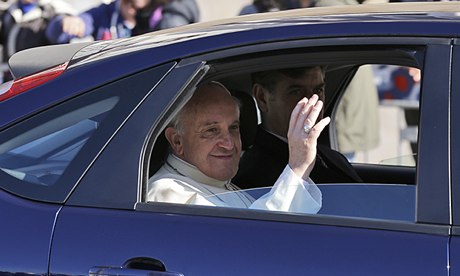 'On Thursday, Pope Francis visited the Italian president, arriving in a blue Ford Focus, with not a blaring siren to be heard.' Photograph: Gregorio Borgia/AP
'On Thursday, Pope Francis visited the Italian president, arriving in a blue Ford Focus, with not a blaring siren to be heard.' Photograph: Gregorio Borgia/AP
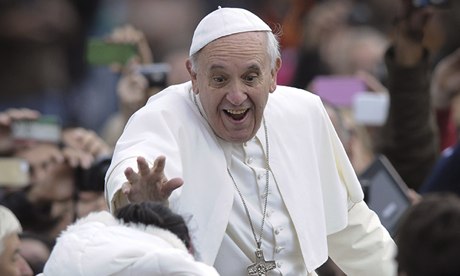 Pope Francis greets people in St Peter's Square on 15 November 2013. Photograph: AGF s.r.l./REX
Pope Francis greets people in St Peter's Square on 15 November 2013. Photograph: AGF s.r.l./REX






 Pope Francis delivers a speech March 15, 2013, during a meeting of the world’s cardinals.
Pope Francis delivers a speech March 15, 2013, during a meeting of the world’s cardinals.



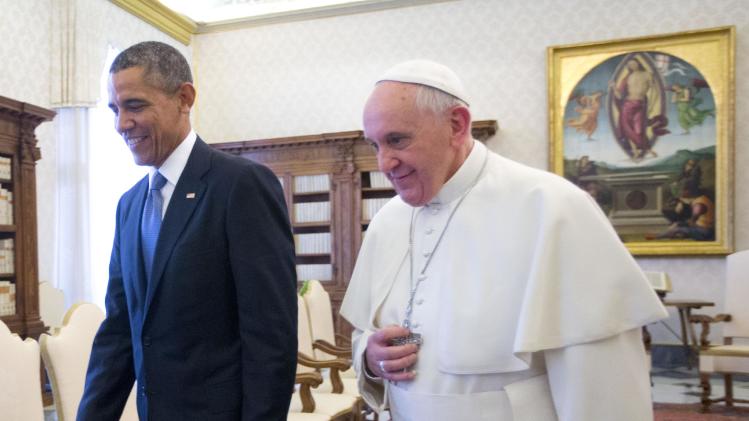
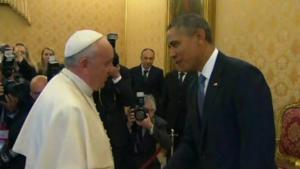
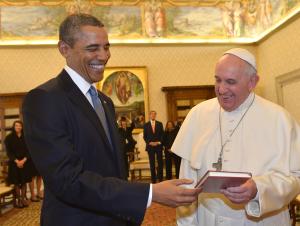
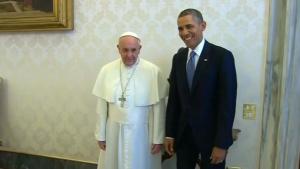
 In an interview on German television to mark the first anniversary of Pope Francis’ pontificate, Archbishop Georg Gänswein, head of the papal household, revealed how he did not favour the election of Pope Francis.
In an interview on German television to mark the first anniversary of Pope Francis’ pontificate, Archbishop Georg Gänswein, head of the papal household, revealed how he did not favour the election of Pope Francis.




Bookmarks